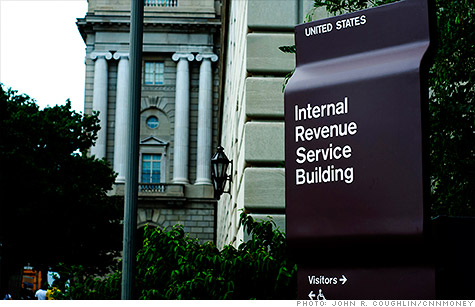Search News

NEW YORK (CNNMoney) -- The IRS has been doling out billions of dollars in fraudulent tax refunds to identity thieves, according to a report released Thursday.
The agency failed to prevent 1.5 million potentially fraudulent tax returns from being processed last year -- resulting in refunds totaling more than $5.2 billion, according to an audit conducted by the Treasury Inspector General for Tax Administration.
While the IRS successfully detected 938,664 identity-theft related tax returns and blocked $6.5 billion in fraudulent refunds from being issued last year, the inspector general said it is "extremely troubling" that so many others slipped through the cracks.
The government watchdog estimates that the IRS could issue $21 billion in fraudulent tax refunds as a result of identity theft over the next five years.
Identity thieves often use the same address to file hundreds -- and even thousands -- of potentially fraudulent returns, the audit found. The same address in Lansing, Mich., for example, was used on 2,137 tax returns, resulting in more than $3 million in potentially fraudulent refunds, according to the report.
In fact, just five addresses were used to file nearly 5,000 returns -- resulting in a total of $8.1 million in potentially fraudulent refunds.
Tampa was identified as the city with the most tax-related identity theft, with more than $468 million in potentially fraudulent refunds. Roughly $130 million of that amount was uncovered in an identity-theft related tax refund scheme that the Tampa Police Department and federal authorities said involved criminals stealing the identities of the deceased and those who receive public assistance.
With an increasing number of people receiving their refunds via direct deposit and prepaid debit cards, it has become harder for the IRS to detect identity theft, especially since the agency allows multiple direct deposits to be made into the same bank account, the report said.
The inspector general's audit also found that the IRS runs into delays when trying to access third-party income and withholding information to confirm a taxpayer's identity, since third parties (like employers) aren't required to submit information to the IRS until March 31, while taxpayers can file their taxes as early as mid-January. Even when third-party information has been submitted, the IRS doesn't have an adequate system for accessing the information, the audit found.
The inspector general made several recommendations to the head of the IRS, including the use of more third-party information from the National Directory of New Hires to improve the identity verification process and to develop a system that analyzes characteristics of past tax returns filed by identity thieves in order to prevent more suspect returns from being processed in the future.
The Taxpayer Advocate Service, the watchdog arm of the IRS, identified similar identity theft problems in its mid-year report to Congress released earlier this summer. It attributed the increase in tax fraud to a number of issues, including an increase in electronic filing, higher dollar amounts of refundable credits and a growing number of people using debit cards to receive refunds. It said it has been hard for the agency to keep up with the fraud because of its shrinking resources and growing responsibilities.
The IRS doesn't deny that identity theft is a big problem for the agency and taxpayers.
"The growth of tax refund fraud committed by identity thieves is one of the IRS' most significant challenges and we continue to devote significant resources to combat it," the IRS said in response to the audit.
But it argues that the inspector general's estimate that it will issue $21 billion in fraudulent refunds over the next five years is "far too high." The IRS said it has already made significant improvements that will greatly reduce the potential for fraud going forward. The IRS said it has expanded its screening filters to catch more fraud and has already flagged nearly double the number of returns for review this year compared to last year.
"Our increased compliance and prevention efforts mean we are stopping more refund fraud than ever before," the IRS said. ![]()

Carlos Rodriguez is trying to rid himself of $15,000 in credit card debt, while paying his mortgage and saving for his son's college education.
| Overnight Avg Rate | Latest | Change | Last Week |
|---|---|---|---|
| 30 yr fixed | 3.80% | 3.88% | |
| 15 yr fixed | 3.20% | 3.23% | |
| 5/1 ARM | 3.84% | 3.88% | |
| 30 yr refi | 3.82% | 3.93% | |
| 15 yr refi | 3.20% | 3.23% |
Today's featured rates: